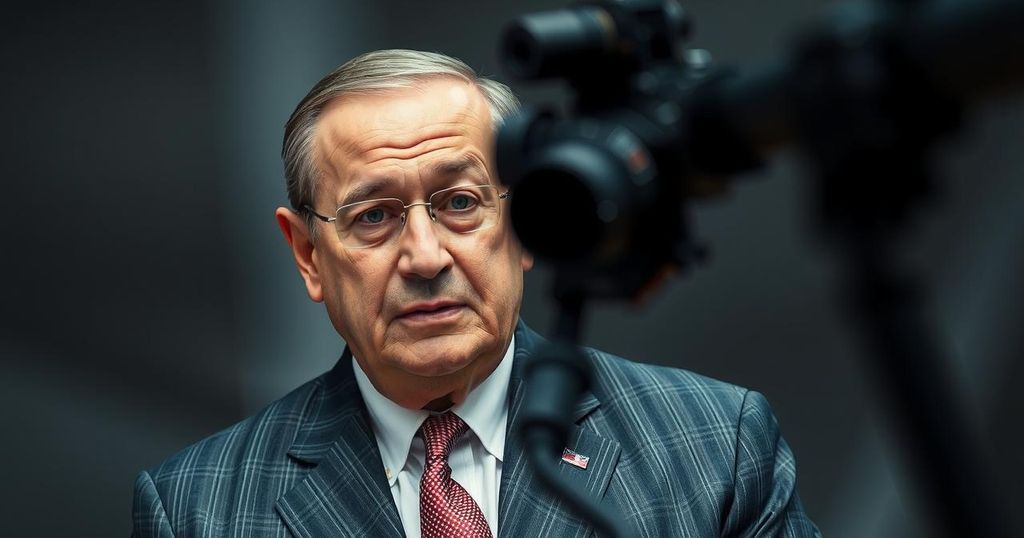The Fall of Assad: A Significant Blow to Russia’s Global Prestige
The fall of Bashar al-Assad represents a severe embarrassment for Russia, which had supported him for nearly a decade. His recent flight to Moscow suggests significant fallout for Russian interests in Syria, including the status of military bases. Russian officials are downplaying the threat to these bases while attempting to blame the Syrian military for the regime’s collapse. The situation shifts public focus from Syria to domestic security amid ongoing military operations in Ukraine.
The recent fall of Bashar al-Assad marks a significant blow to Russia’s stature on the international stage. For almost a decade, Russian military support was pivotal in sustaining Assad’s regime in Syria. However, in a dramatic turn of events, the Syrian president has reportedly fled to Moscow, resulting in Russia granting him and his family asylum due to humanitarian reasons. This swift unraveling of the Kremlin’s involvement in Syria leaves it in a precarious position, raising serious questions about the future of its military bases in the region.
The Russian foreign ministry expressed alarm over these unfolding circumstances, indicating a sense of urgency in monitoring the situation closely. For Russia, supporting Assad was not merely a strategic move in a foreign conflict; it was a vital component of its aspiration to establish itself as a formidable global influence. Putin’s 2015 intervention in Syria was seen as a critical challenge to Western dominance, strategically positioning Russia in the Middle East while securing significant military footholds.
These bases in Hmeimim and Tartous, now placed on high alert, provided Russia with crucial access points for military operations in both Syria and Africa. Despite this, assertions from Russian officials that they remain in contact with Syrian opposition groups, accompanied by statements claiming there is no immediate threat to their interests, seem to mask an underlying concern regarding the stability of these installations.
Meanwhile, Russian media outlets appear to be seeking explanations for Assad’s abrupt downfall, hinting that internal failures within the Syrian military may have played a role in the regime’s weakening. Yevgeny Kiselev pointedly criticized the Syrian armed forces for their inadequate defense, suggesting they had capitulated in key confrontations with minimal resistance. This narrative attempts to mitigate blame directed at the Kremlin for the loss of a key ally, focusing instead on the perceived failures of Syrian forces.
This shift indicates a broader strategy to redirect public attention away from the Kremlin’s involvement in Syria and towards addressing immediate domestic concerns amid Russia’s ongoing military operations in Ukraine. The resilience of Russian public support is contingent on how effectively the state communicates these developments, pivoting discussions toward national security issues rather than international setbacks.
For nearly a decade, Russia’s military presence in Syria played a crucial role in maintaining the regime of Bashar al-Assad against a backdrop of civil unrest and conflict. Russia’s military intervention, which began in 2015, was initially celebrated as a successful assertion of its global influence, showcasing its capability to operate beyond its borders. The strategic placement of military bases solidified Russia’s foothold in the Eastern Mediterranean, creating avenues for geopolitical maneuvering, particularly concerning its relations with the West. However, with the recent downfall of Assad, Russia faces critical challenges, including the potential impact on its military assets in Syria and its broader geopolitical ambitions.
In summary, the fall of Bashar al-Assad profoundly undermines Russia’s global prestige and effectiveness in foreign policy within the Middle East. Following years of significant investment in support of the Assad regime, the Kremlin finds itself in a precarious situation filled with uncertainty regarding its military infrastructure in Syria. While Russian authorities attempt to deflect blame and shift public focus to domestic security concerns, the implications of this regime change pose challenging questions about Russia’s influence and strategy in the region moving forward.
Original Source: www.bbc.co.uk




Post Comment